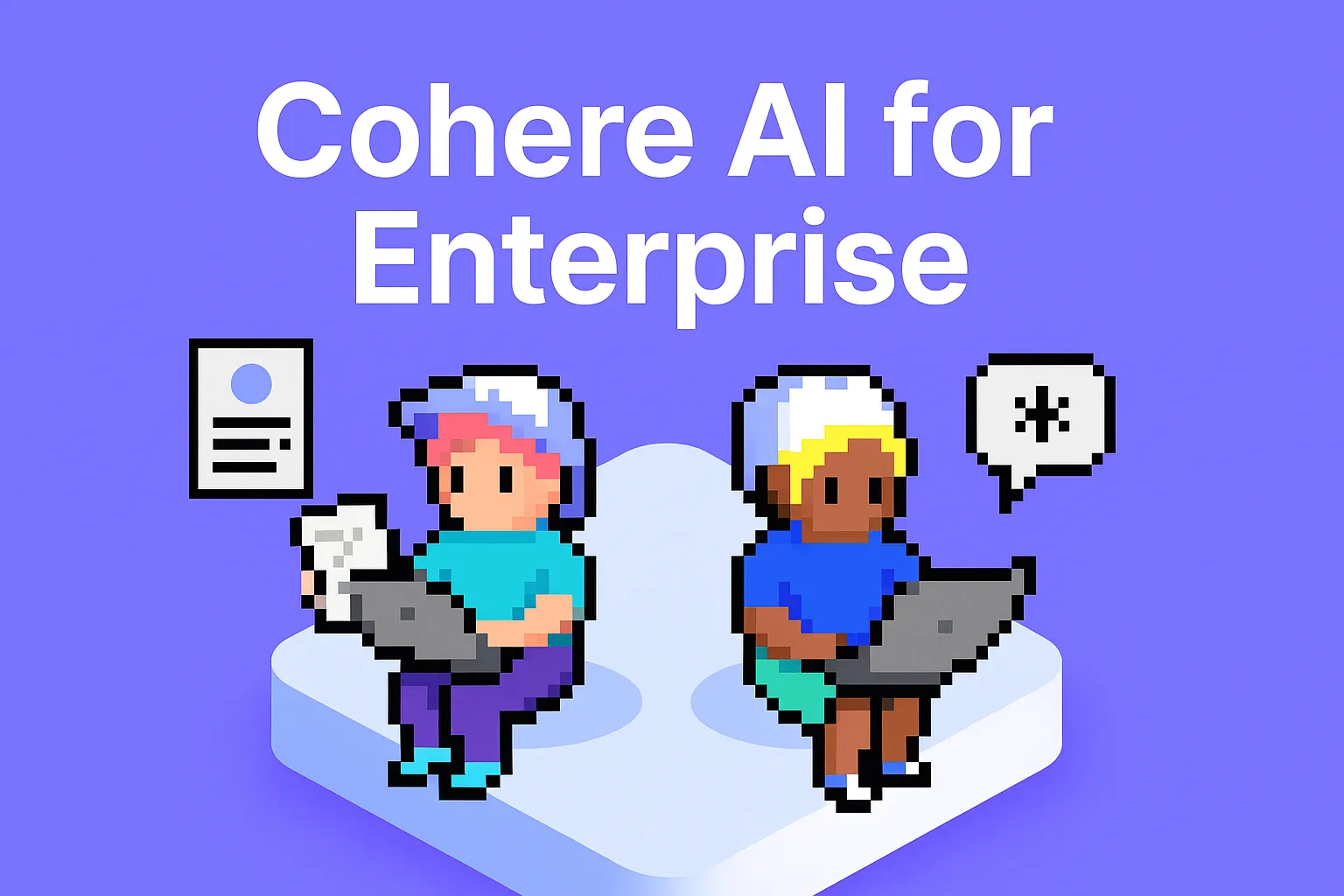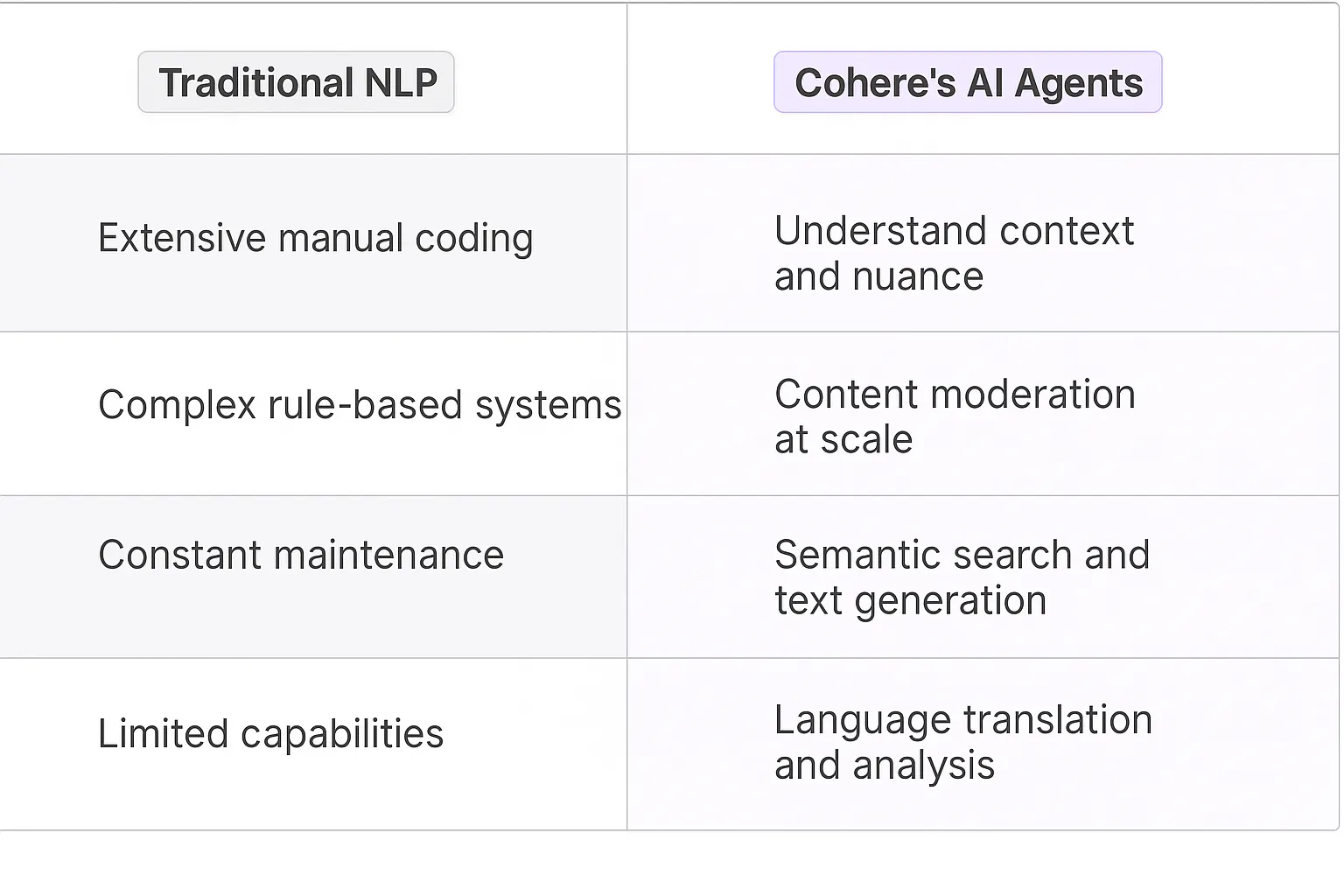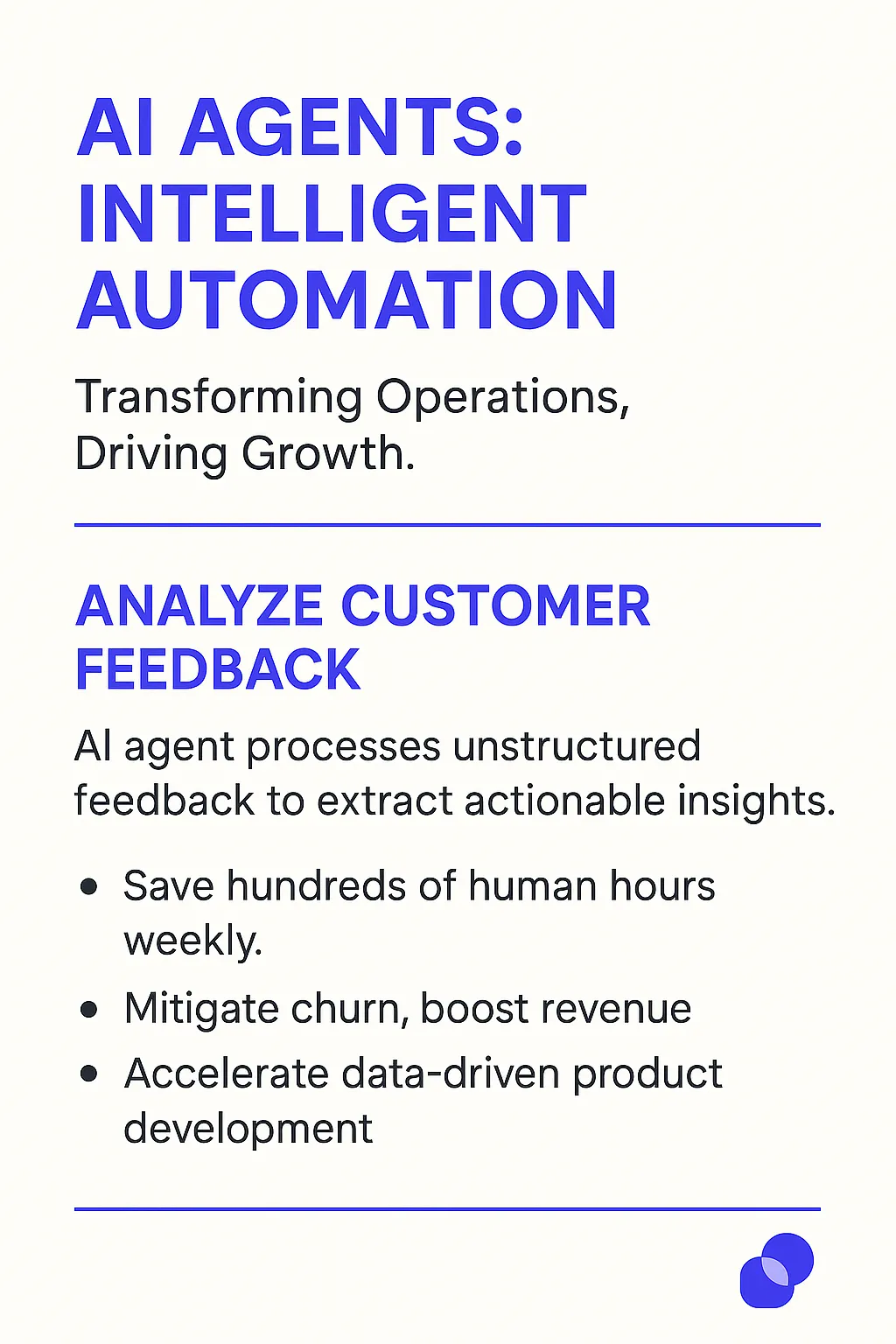Cohere
Understanding Cohere's Enterprise AI Platform
What is Cohere?
Cohere stands at the forefront of enterprise-grade language AI, providing sophisticated natural language processing capabilities through its advanced AI models. The platform enables organizations to deploy production-ready language AI solutions without the complexity of building and maintaining custom models. Unlike conventional NLP tools, Cohere's technology understands context, nuance, and industry-specific terminology, making it particularly valuable for complex business applications.
Key Features of Cohere
- Advanced semantic understanding that captures subtle contextual meanings
- Enterprise-scale processing capabilities handling millions of documents
- Adaptive learning systems that improve with increased usage
- Industry-specific knowledge integration
- Robust API infrastructure for seamless integration
- Comprehensive security and compliance frameworks

Benefits of AI Agents for Cohere
What would have been used before AI Agents?
Traditional natural language processing required extensive manual coding, complex rule-based systems, and constant maintenance. Development teams spent countless hours fine-tuning algorithms and updating language models. Companies either built basic chatbots with limited capabilities or relied on human teams to handle all language-related tasks like content moderation, text analysis, and customer interactions.
What are the benefits of AI Agents?
Cohere's AI agents represent a fundamental shift in how organizations handle natural language tasks. The agents can understand context and nuance in ways that were impossible with rule-based systems. They excel at:
- Content moderation at scale - detecting nuanced policy violations across millions of posts without adding human moderators
- Semantic search - understanding the true meaning behind user queries rather than just matching keywords
- Text generation - producing human-quality content while maintaining consistent brand voice and style
- Language translation - preserving cultural context and idioms when translating between languages
- Data analysis - extracting insights from unstructured text data in documents, emails, and messages
The network effects are particularly powerful - as more organizations use Cohere's agents, the underlying models become more sophisticated at understanding industry-specific terminology and use cases. This creates a flywheel effect where improved performance drives greater adoption.
From a business perspective, Cohere's agents reduce the technical barriers to implementing advanced NLP capabilities. Organizations can deploy production-ready language AI without building and maintaining their own models. This dramatically accelerates time-to-value while reducing engineering costs.
The bottom line impact comes from both cost reduction (fewer human hours spent on repetitive language tasks) and value creation (being able to process and analyze text data at previously impossible scales).

Potential Use Cases of AI Agents with Cohere
Processes
Cohere's AI agents excel at handling complex language-based workflows that traditionally required significant human oversight. They can analyze customer support tickets and route them to appropriate departments based on urgency and topic. The agents process large volumes of product feedback, identifying patterns and extracting actionable insights that drive product development decisions.
In content operations, Cohere agents can maintain consistent brand voice across multiple channels by reviewing and adjusting content pieces before publication. They detect subtle tonal shifts and suggest improvements that align with established style guides.
Tasks
The granular capabilities of Cohere agents shine in specific, high-value tasks that blend language understanding with business logic. These digital teammates can:
- Generate product descriptions that adapt to different marketplace requirements while maintaining SEO effectiveness
- Analyze customer reviews across multiple languages to identify sentiment patterns and product improvement opportunities
- Create targeted email responses that match previous customer interactions and company voice guidelines
- Extract key data points from unstructured documents like contracts, reports, and research papers
- Monitor social media conversations to identify emerging customer needs and potential issues
The real power emerges when these tasks chain together. A Cohere agent can spot a customer complaint on social media, analyze the sentiment and urgency, draft a response, and route it to the right team member for final review - all while maintaining detailed context logs.
For technical teams, Cohere agents can parse documentation, suggest code improvements, and help maintain API documentation accuracy. They excel at identifying inconsistencies in technical writing and ensuring documentation stays synchronized with code changes.
The growth potential lies in combining these capabilities with domain expertise. When Cohere agents learn industry-specific terminology and workflows, they transform from general-purpose tools into specialized digital teammates that understand the nuances of specific business contexts.

Industry Use Cases
Cohere AI agents are transforming how businesses operate across multiple sectors, with implementations that go far beyond basic automation. The real power lies in how these digital teammates adapt and scale to industry-specific challenges while maintaining consistent performance.
What makes Cohere's approach particularly compelling is their focus on natural language understanding at an enterprise scale. From financial services firms processing thousands of documents daily to healthcare providers analyzing patient feedback, these AI agents handle complex language tasks with remarkable precision.
The following industry applications demonstrate how Cohere's technology tackles specific business challenges through sophisticated language processing and generation capabilities. Each use case represents a concrete example of AI augmenting human capabilities rather than replacing them.
Looking at actual implementations across different sectors reveals a pattern: successful deployments of Cohere AI agents tend to focus on high-value, language-intensive tasks where human expertise remains essential but can be significantly enhanced through AI support.
How Legal Teams Scale Contract Review with Cohere AI
Legal departments face a massive challenge: reviewing thousands of contracts while maintaining accuracy and managing costs. The traditional approach of manually reviewing each document creates bottlenecks, burns out talented attorneys, and limits growth. Cohere's language AI transforms this process.
A mid-sized law firm handling M&A due diligence might process 500+ contracts monthly. Their Cohere-powered digital teammate can analyze these documents in minutes rather than weeks, flagging key provisions, non-standard clauses, and potential risks. The AI doesn't just search for keywords - it understands complex legal concepts and how they relate to the firm's requirements.
The real power comes from Cohere's ability to learn specific legal frameworks and precedents. When reviewing employment agreements, it identifies subtle variations in non-compete clauses that could impact enforceability. For lease agreements, it catches missing renewal terms or unusual maintenance obligations that human reviewers might miss during a late-night review session.
But this isn't about replacing attorneys - it's about amplifying their capabilities. Lawyers can focus on strategic analysis and complex negotiations while their AI teammate handles the initial review pass. The result? A 4x increase in contract processing speed with improved consistency and reduced burnout.
The network effects are fascinating: as more contracts flow through the system, the AI's understanding of industry-specific nuances deepens. A clause that might seem standard in tech contracts could raise red flags in healthcare agreements. This contextual learning creates a powerful feedback loop that makes the entire legal team more effective over time.
How Healthcare Providers Enhance Patient Care with Cohere AI
Healthcare organizations process millions of patient interactions, medical records, and clinical notes daily. The volume of unstructured medical data creates a massive cognitive load for healthcare providers. Cohere's language AI transforms how medical teams handle this information overload.
Take Metropolitan Health Network, operating across 12 hospitals with 3,000+ providers. Their clinical teams used to spend 6+ hours daily documenting patient encounters and searching through records. By implementing Cohere's AI, they've cut documentation time by 70% while improving accuracy of patient records.
The AI's deep understanding of medical terminology and context sets it apart. When analyzing clinical notes, it identifies subtle patterns that might indicate developing health issues. For example, it can correlate seemingly unrelated symptoms across multiple visits that human providers might miss during rushed appointments.
What's particularly compelling is how the AI handles the complexity of medical specialties. In cardiology, it understands the nuanced differences between various heart conditions and their symptoms. In oncology, it tracks treatment responses across time, helping doctors adjust care plans based on patient-specific outcomes.
The network effects in healthcare are profound. Each patient interaction enriches the AI's understanding of treatment efficacy and outcomes. When a new treatment protocol shows success with certain patient demographics, the system flags these patterns for medical teams to evaluate.
Beyond direct patient care, the AI helps providers navigate insurance requirements and regulatory compliance. It automatically maps treatments to billing codes and flags potential compliance issues before they become problems. This reduces administrative burden while ensuring proper reimbursement.
The most significant impact? Doctors can finally focus on patients instead of paperwork. They're having longer, more meaningful conversations during appointments because they're not tied to their keyboards. This shift back to patient-centered care represents the true promise of AI in healthcare providers.
Considerations for Cohere AI Implementation
Implementing Cohere AI agents requires careful planning and strategic decision-making across multiple dimensions. Organizations need to evaluate their technical infrastructure, data governance policies, and team readiness before deployment.
Technical Challenges
API integration complexity often surfaces as the first major hurdle. Development teams must handle rate limiting, error handling, and response parsing while maintaining high performance. The Cohere API requires careful management of token usage and model parameters to optimize both cost and performance.
Data preprocessing emerges as another critical technical consideration. Raw text inputs need cleaning, formatting, and proper encoding. Teams must implement robust validation layers to ensure data quality and prevent hallucinations or unexpected outputs.
Operational Challenges
Cost management becomes increasingly important at scale. Teams need to implement usage monitoring and establish clear guidelines for API consumption. Without proper controls, costs can spiral quickly, especially during high-traffic periods.
Training and documentation requirements often get overlooked. Teams need comprehensive onboarding materials and clear usage guidelines. Engineers must understand model capabilities, limitations, and best practices for prompt engineering.
Security and Compliance
Data privacy concerns require careful attention. Organizations must audit their data handling practices and ensure compliance with regulations like GDPR and CCPA. Implementing proper access controls and data retention policies becomes crucial.
Model output validation needs systematic approaches. Teams should establish quality control processes to monitor and validate AI-generated content. This includes implementing human review workflows for sensitive use cases.
Performance Optimization
Response time optimization requires careful architecture decisions. Caching strategies, request batching, and asynchronous processing patterns need evaluation based on specific use cases.
Scaling considerations affect both infrastructure and cost management. Teams must plan for traffic spikes and implement proper load balancing while maintaining consistent performance.
Transformative Impact and Future Potential of AI Language Processing
The implementation of Cohere's AI agents marks a significant shift in how organizations handle language-intensive tasks. While technical challenges and operational considerations require careful planning, the demonstrated impact across industries validates the technology's transformative potential. Organizations that successfully navigate the implementation process gain powerful digital teammates that continuously evolve and improve, creating lasting competitive advantages through enhanced language processing capabilities.
The network effects and continuous learning aspects of Cohere's technology suggest we're just beginning to see its full potential. As more organizations adopt these capabilities, the underlying models will become increasingly sophisticated, opening new possibilities for innovation and efficiency across industries.













